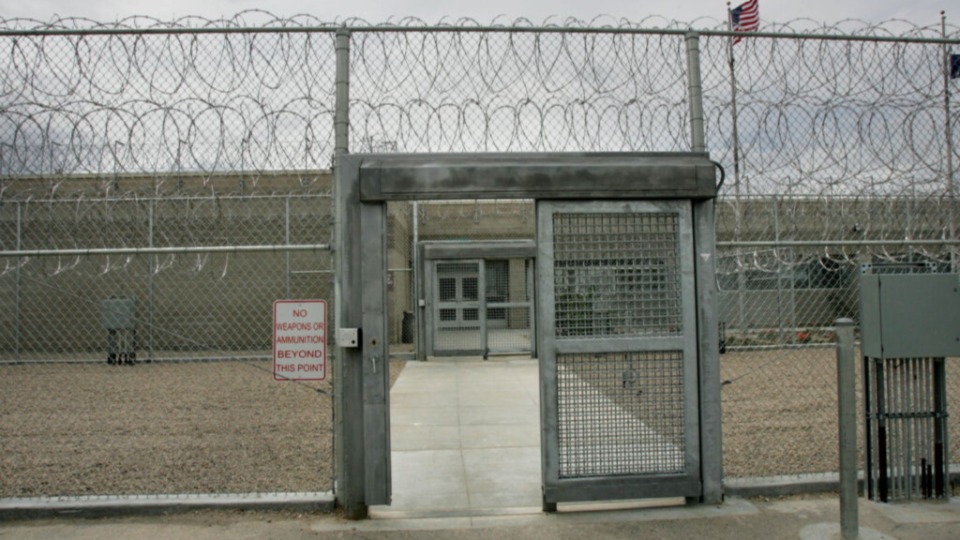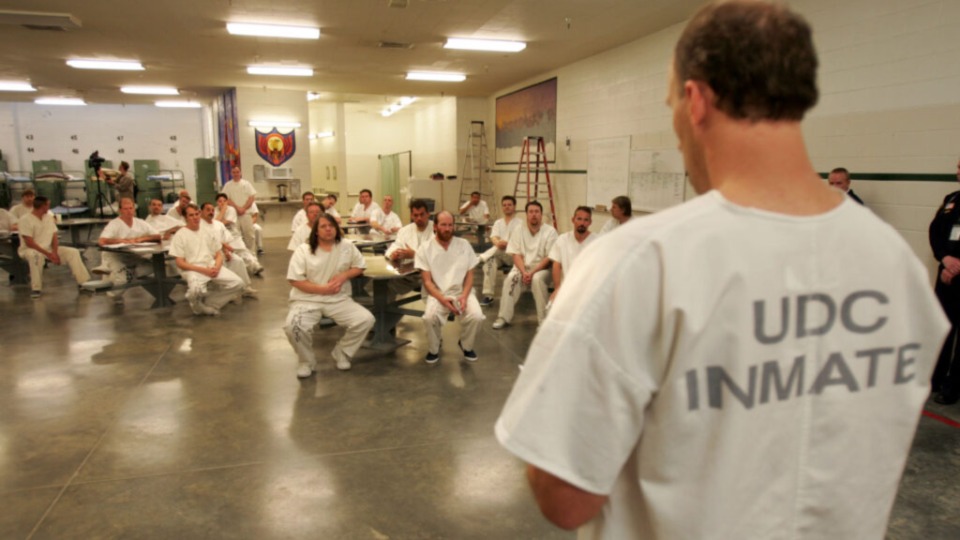
This story appears here courtesy of TheChurchNews.com. It is not for use by other media.
By Sydney Walker, Church News
When Steven Smith became president of the Promontory Branch at the Utah State Prison in 2018, he and fellow branch leaders created a goal to help adults in custody increase their spiritual self-reliance.
The Promontory Correctional Facility houses men who are actively participating in treatment programs. They live within a structured community and are separated into dorms.
To get the inmates more involved, branch leadership started several courses, including “7 Habits of Highly Effective People,” based on the book by Stephen Covey; Real Transition, which focuses on physical, spiritual, financial, emotional and social development; and the Church’s 12-step Addiction Recovery Program. They also began holding movie nights and other activities, in addition to existing Sunday worship services and Institute of Religion classes.
Volunteers from outside the prison came in to teach the classes and support the activities, which became highly successful. Then the COVID-19 pandemic hit.
On March 12, 2020, prisons were locked down. Branch leaders and volunteers could no longer go inside. The future of the classes and activities was uncertain.
But thanks to a faithful and dedicated group of incarcerated men — and support from President Smith, prison officials and chaplain — religious programming continued with a peer-led approach and ultimately expanded from 12 to 30 hours a week, despite pandemic restrictions.
“In times of trial, we find great opportunity to do things better,” said Smith, who was released as branch president last year.
One inmate, who helped support the efforts while incarcerated and was recently released from prison, told the Church News: “We call it the ‘miracle of Promontory,’ this big movement towards coming unto Christ in prison.”
How It Happened
The former inmate remembers how difficult it was in March 2020 when lockdowns began. “We were so hungry for teachings and for the good word of God to be taught by these great volunteers that when COVID hit and they left, it was very hard on us,” he recalled.
At the time, he helped in the prison family history library. He said he felt inspired to ask officers if inmates could continue meeting without the volunteers. Permission was granted, with an initial limit of 10 people per meeting.
“I truly have to give credit to the officers,” the former inmate said. “They trusted us and they allowed us, and we proved ourselves and gained more trust. …
“The progress happened — it was step by step, it was line upon line, it was trust by trust.”
Over time, the classes, again, became successful and new courses were added, including some in Spanish. Attendees were careful to follow all COVID-19 protocols. The chaplain played a crucial role in delivering materials, and President Smith maintained contact and offered support through letter writing.
“The Lord just made things happen,” the former inmate said. “It wasn’t anything I did. He put things in place.”

Prior to his release, 30 hours of classes were being held each week with an average 600 monthly attendees — many of whom were not members of the Church. Four Sunday worship services were held to accommodate the high interest and size restrictions.
The religious programming continues today, organized and taught by inmates with oversight by Church leaders.
“It was the different levels of influence of Jesus Christ,” the former inmate said of the programming’s success. “That is the key, is Jesus Christ. And it was at any level that people were ready for, we had something for them.”
He referenced a quote from Sister Wendy Nelson, wife of President Russell M. Nelson: “I try to do everything I can to make sure my husband feels loved, adored, wanted and needed. We call it L.A.W.N. in our family.”
“In prison,” he said, “it did not matter what beliefs you had. We just made sure everybody felt loved, adored, wanted and needed, with the focus around Christ.”
His counsel to other groups looking to try a similar peer-led approach: “Be courageous and follow the Spirit. … Do something. Act. Don’t just sit back and think ‘I can’t make a difference.’ Because we all can make a difference, no matter where we’re at. With God’s help, we can help other people.”
Lessons Learned
Smith also highlighted a few lessons he learned from a leadership perspective.
“The No. 1 lesson for me was the men and women who were incarcerated need the opportunity to serve,” he said.
Anxiety, depression and fear among the inmates were heightened during pandemic lockdowns. “I could tell from their letters that they were just sad. I mean, no visitors, no family, no volunteers, very little association with others outside of their dorm. …
“The answer for depression, in my mind, was distraction, plus, you need to find ways to serve other people. And 30 hours of classes gave ample opportunities for the men to serve each other. If they weren’t actually teaching or facilitating, they were participating.”
Another lesson Smith identified is being creative in dealing with challenges and hardship.
“There’s nothing like inmates teaching inmates,” he said. “It’s the very best teaching pattern. These men, they know exactly what they’re going through, and so they relate to them at a level that no one from the outside could ever relate to them.”
Lastly, the power of writing letters.
Though he couldn’t be inside the prison as the inmate helped revitalize the courses and activities, Smith offered support and encouragement through letters. He consistently wrote the other inmates as well, sometimes up to 80 letters a week.
“During COVID, I had an official list of 164 pen pals. A pen pal is anyone who writes me at least monthly,” he said. The chaplain helped deliver the letters back and forth.
The inmates opened up through letter writing, and it gave Smith a way to support the inmates in their individual journeys.
“The best thing we can do as members of the Church is, let’s write them letters. … If they don’t have healthy connections on the outside, they’re going to go back to their unhealthy connections when they get out. So, the lesson for us, on the outside is, let’s be someone who can support an inmate,” he said.
Coming sometime in the first quarter 2022 is a new Church website for ministering to those affected by incarceration. The Church Prison Ministry group can be reached at prisonministry@ChurchofJesusChrist.org.
Copyright 2021 Deseret News Publishing Company